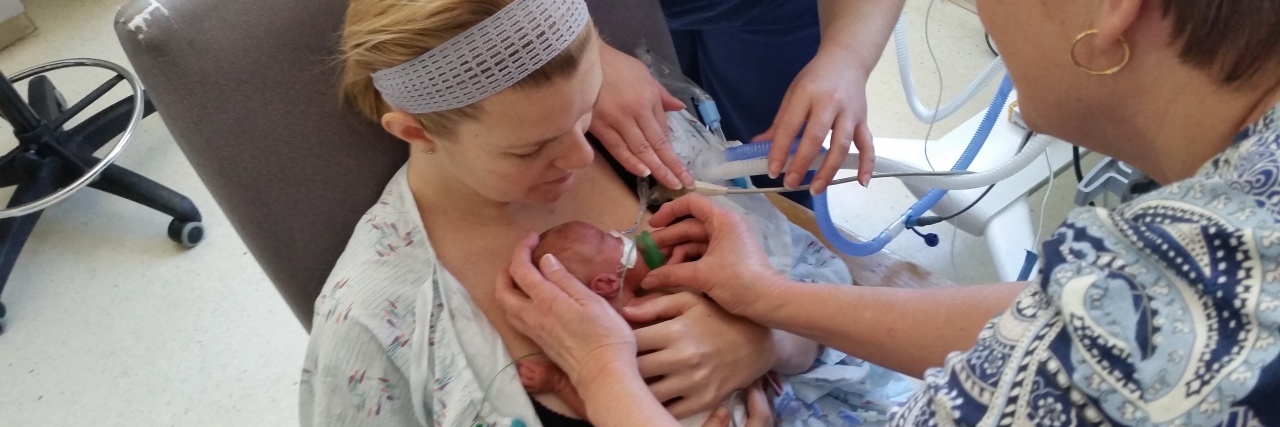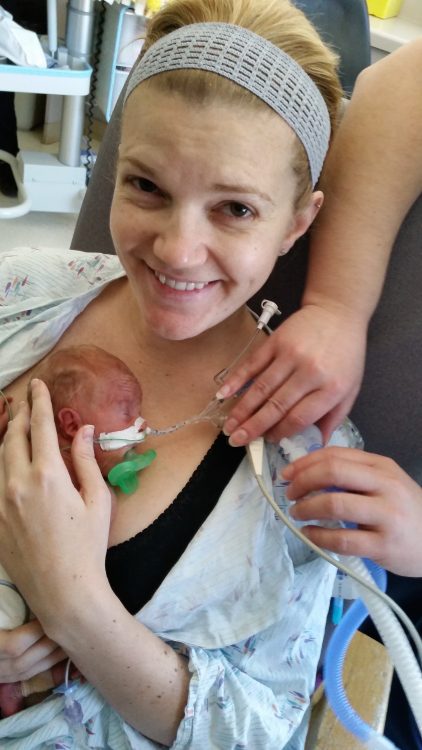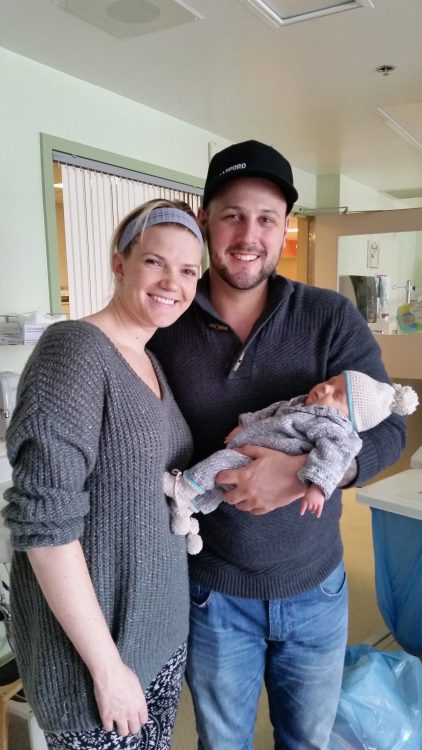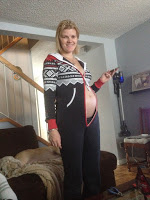
On the morning of January 11, 2015 I took a photo of my cute little growing belly sticking out of my onesie. I was a few days from entering my third trimester. Being pregnant with you was the best I ever felt. Other than the nausea, I felt amazing and the most confident I have ever been. Any superficial insecurities I had were erased by the new form my body was taking and the feeling that I was doing what I was supposed to be doing.
How things can change so quickly.
My back started to ache… but wasn’t that normal with a growing belly? It was getting late and I just wanted to rest. If I could just close my eyes and sleep I would feel better in the morning. One last attempted pee and I would go to bed. I am so thankful I tried to go to the bathroom one last time. I called to your dad, “I’m bleeding! We need to go to the hospital.” He raced us to the hospital in what seemed like record time. The drive seems like a blur; I remember focusing on the grip my hand had on the passenger side door, the back ache turning into pain.
The hospital seemed quiet and huge. Up at labour and delivery I fumbled to find my health card while I told them I was 27 weeks five days pregnant and bleeding. I passed my wallet over to your dad to find my card as they told me to come with them. The nurses were calm. I felt lost. Then we heard your heart beat. Your healthy, strong heart beat. A wave of relief came over me. At this point, even though the pain was getting worse, your heart beat was strong, so as we waited for the doctor to come, I assumed everything was going to be OK. Upon a very quick exam, the doctor told us my membranes were ruptured.
“What does that mean?”
She said I was 7 centimeters dilated.
“What does that mean?”
She said I was in labor.
It was at this point I think my body went fully into shock. They were going to try to slow down labor, but there was no stopping it. I was admitted to the hospital at 10:40 p.m. and you were born at 10:49 p.m. There was no connection between my body and brain at that point, but I do remember hearing the faint sound of your cry before they whisked you off.
My body failed us, failed you and now we were there with all 2-pounds 14-ounces of you fighting for your life. From the second you entered this world your dad and I were ready to fight this fight with you.
“Does he have name?” The doctor asked us. The nurses asked us. We thought we had three more months to figure that out. It wasn’t until the early hours of the morning that your dad turned to me and said, “His name is Cruz.” You had cruised on into our lives and whatever was to lie ahead, you were going to cruise through that as well.
Shortly after you were born, they brought your dad back to see you. He took a photo of you to bring back to me, as I wasn’t allowed to leave the delivery bed to ensure I was physically and emotionally stable enough to move. The photo was of your perfect tiny body lying in a Ziploc bag — the most medically advanced way to keep your body temperature regulated. You had your tongue sticking out, your big personality already shining through. Your eyes were almost completely fused and your ears still stuck to the side of your head. You had wires connecting to various parts of your body. They measured your heart rate, respiratory rate and oxygen saturation. You were going to be tube fed for the unforeseeable future. You wore the tiniest little mask (CPAP — continuous positive airway pressure) to help get oxygen and pressure into your underdeveloped lungs.
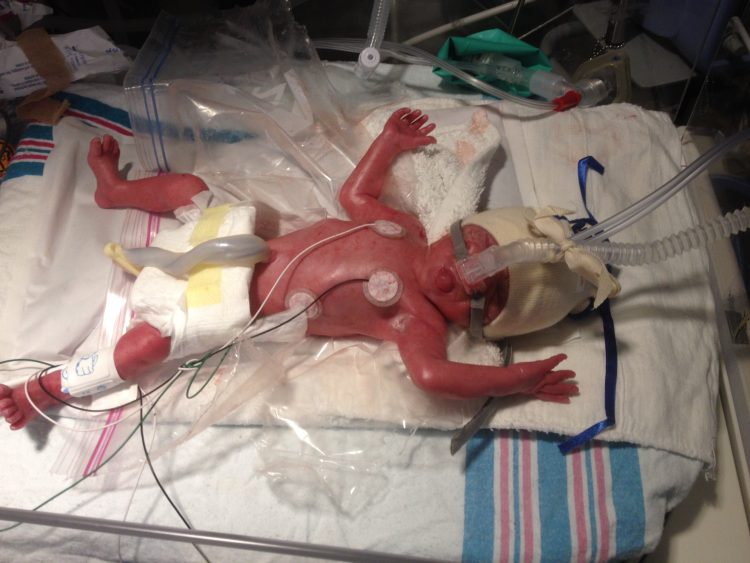
By the time I was able to be wheeled in to see you a few hours after your birth, that mask was switched to intubation. Your lungs and body were too tiny to breath on their own; you needed help and we would soon find out you had a pulmonary hemorrhage (a bleed in your lungs). You were relying on machines and strangers to keep you alive, all things that I should have still been doing. You lay there in an isolette, a plastic box that kept your environment as close to that of my womb, getting the temperature and humidity as ideal as possible. A nurse asked if I wanted to touch your arm. Of course I did! I must have had a terrified look in my eyes. She assured me it was OK. I was to touch you with a firm touch, not to stroke you softly as your skin was so thin that rubbing would be painful and damaging. Your hand covered my fingernail and not much else. We thought your hair was dark, but soon you had a sponge bath and the blood was washed off your head to show your beautiful blonde hair.
In the first 24 hours we received an overload of information and possibilities and gave consent for you to receive a blood transfusion. We familiarized ourselves with the protocol of entering the neonatal intensive care unit (NICU) and learned to wash our hands with surgical precision. Day one of life at 10:49 p.m., “Cruz is officially 1 day old. We made it through one day. Happy birthday Cruz.” Every day at 10:49 p.m. until the day you were discharged we would say those words. We weren’t told much about what to expect and were encouraged not to focus on the future, but to just process what was going on now.
Day 2 of life. No one told us what to do when the “now” becomes too much to bear. The walk down the hall to the NICU started to become familiar. We opened the door, scrubbed our hands, said hi to whomever was working the front desk and waited to enter. Turning the corner to the room, I could immediately feel the panic in the room. You were surrounded by what seemed like an army of people. A doctor turned to see us standing there. In a commanding, firm and uncomforting voice he said, “Take them to the family room.” My eyes darted to you — the stillness of your body. In that moment, I thought you were gone. My legs felt weak but somehow managed to keep me standing. Inside I was screaming for someone to tell me you were alive, but no words came out. I frantically searched the room and found faces that didn’t want to meet my eye. I saw our nurse pushing forward toward us, obviously recognizing faces of parents who think they are witnessing their child’s lifeless body. I don’t remember the specific words she said, but they were enough for us to know you were alive. I was able to formulate a few words, “He’s OK?” She nodded and said you were stable now. Little did I know that if we had entered the room moments earlier we would have seen the scramble to save your life. You were doing so well they tried to extubate you, at which time they discovered your pulmonary hemorrhage. You were bleeding in your lungs and CPAP was not enough to keep you breathing. The quick-acting doctor reintubated you and got you stable again. The nurse, one of a few that became our lifeline there, held us as she explained all this. It would be another nine days before you could be extubated. When the doctor came to talk to us, he said what he probably thought was comforting, “Whatever god you believe in, you just have to pray.” They tried to discharge me that day. There was no way I was going home. I begged, explaining that I may be physically OK to leave, but it would be an emotional catastrophe if they made me be away from you. Every day, they tried to discharge me. Five days later, I gave in and let them send me home.
I learned to analyze the smallest of things — the look on the face of the woman at the front, the way the nurse greeted me when I came in or called, the sound of footsteps coming towards us. It was like we were waiting for the next devastating blow and needed a friendly hello to reassure us. The sight of certain numbers on my phone (unknown or hospital) would send paralyzing chills through my body. I learned medical jargon fast and could quickly understand everything that was said during rounds with your doctors and nurses. I would watch as they would suction your lungs, looking to spot how much blood was coming up. I would pray for no blood, but would be relieved when it was pinkish, as that meant it was no longer fresh. Old blood was the next best thing to no blood.
We celebrated a lot. Every milestone was a miracle: your first bowel movement, the first time you wore clothes, every ounce you gained, the first time you took a bottle, the first time you nursed. The first time I held you! You were 9 days old, still intubated, but stable enough to move. I was so nervous. You had wires and tubes everywhere. I sat eagerly, waiting for them to pick you up. It took two nurses, one to hold you and one to bring all the tubes and wires. As they lay you on my chest, a wave of emotions spilled from me, but I remained still, too scared to move even the slightest and have a tube come out of place. That moment was perfect. Every moment I held you was perfect. Together, our bodies synced. You erased all my fears and made the chaos around us disappear. Lying on me, you would take cues from my body. With the rise and fall of my chest, your breathing would regulate, your oxygen saturation would improve and your heart rate would steady.
As a family, we began to navigate this unpredictable life in the NICU. Every morning I would drop off an insulated bag with my pumped breast milk to be fed by tube until you developed the suck/swallow reflex full-term babies are born with. Before feeding you (every 3 hours), we would clean your face, using a small gauze pad soaked in sterile water to wipe your eyes and a soaked q-tip to freshen your mouth. We would take your temperature in your armpit then rotate the location of your oxygen saturation monitor probe, alternating hands and feet, then change your diaper, weighing it before disposing of it to keep track of fluid intake and elimination. On the nights you received a bath, we would wait until later in the evening when it was typically quieter. We would fill a small steel bowl with lukewarm water and remove all your connections to monitors (this being the most nerve racking/stressful time until you were much bigger and stronger and your desats were less frequent). With one hand remaining under your head and body we would place you in the water and put a cloth on your belly to help keep you warm. You loved (and still do) your bath time. Nurses would often comment on how unusually calm you were in the water. Your little eyes looking up at us, you enjoyed every minute of your spa time, as we gently massaged your head with soap.
All of this began to be normal. Our normal. When you were big enough to wear clothes, I felt like any other mom picking out her son’s adorable tiny outfit. Slowly, IVs and tubes started to disappear and ounces were gained. The tiny hole in your heart (PDA), although it didn’t close, became small enough to not be a concern. Your lungs stopped bleeding and, after 11 days, you were able to graduate from intubation to CPAP, after another four weeks, you were breathing fully on your own. Your spells (apnea accompanied by bradycardia with low blood oxygen levels) stopped and you were weaned off caffeine. Your feeding tube was removed and you were exclusively bottled and breastfed. Then after 80 days, you came home! All 10 tiny fingers and 10 tiny toes home at last, where you belonged.
Your story isn’t an easy one, but it’s yours and it’s made you who you are today and therefore, it’s perfect.
Follow this journey at Cruz With Me.

